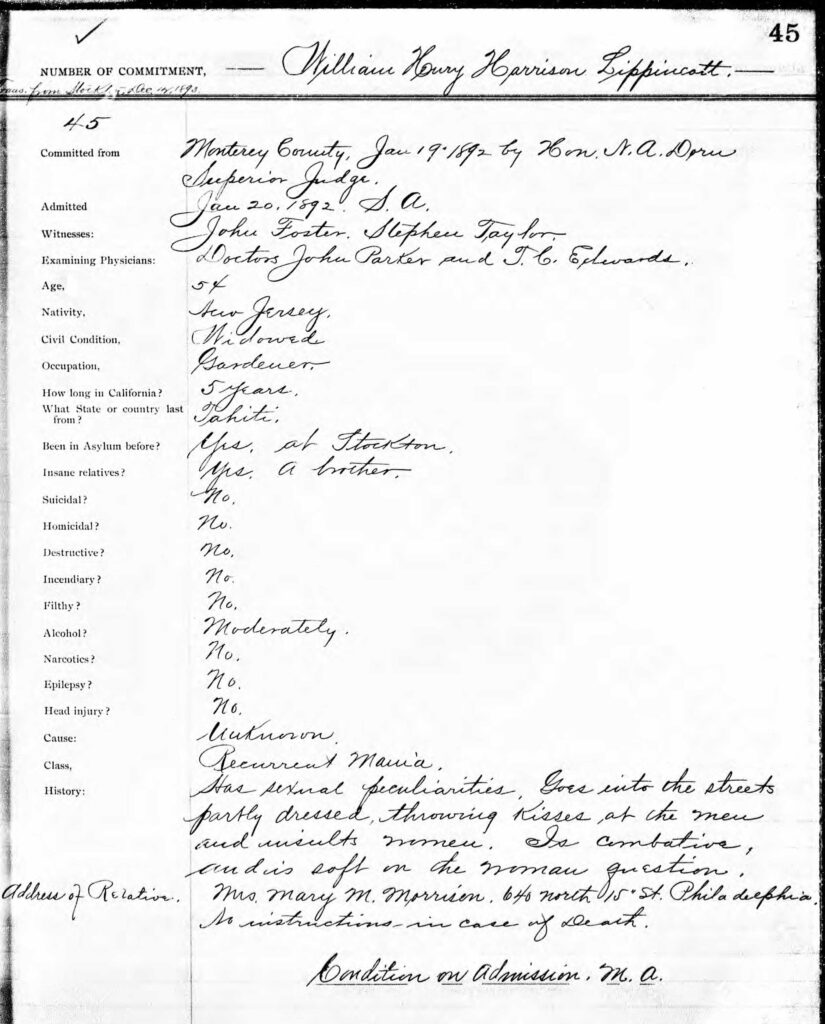Medical Records
During a recent LGBTQ Genealogy presentation in Ohio, a participant reminded me of an additional genealogical record source that could provide insights into LGBTQ history – medical records. Similar to the discussion on Police and Prison Records in Part 13, medical records are generally not accessible to the public. However, with diligent searching and a bit of luck, some records may be unearthed. Specifically, we are interested in records from asylums, mental health institutions, or state hospitals where LGBTQ individuals were committed due to perceived deviancy.
It’s essential to recall that the American Psychiatric Association only removed Homosexuality from the Diagnostic and Statistical Manual of Mental Disorders (DSM) in 1973.[1] For a century before that, LGBTQ individuals underwent forced admission to mental institutions, subjected to barbaric, non-evidence-based psychiatric practices that resembled torture. Records from these institutions may still exist, either online or offline.
Ancestry, for example, hosts a database for the California State Hospitals in Mendocino, Sonoma, and Stockton, now part of the State Archives. A brief exploration of the “California, U.S., State Hospital Records, 1856-1923” collection revealed a record for William Henry Harrison Lippincott, a 54-year-old widowed gardener from New Jersey. Committed by a judge to the Mendocino State Hospital from Monterey County on January 20, 1892, his classification was “Recurrent Mania.” The record noted, “Has sexual peculiarities. Goes into the streets partly dressed, throwing kisses at the men and insults women. Is combative, and is soft on the woman question.”[2]
The peculiarities of Mr. Lippincott’s behavior in 1892 may seem commonplace today when performed by a fabulous drag queen. She could be complimenting men while being catty to women, without any fear of being apprehended. This 1892 case serves as a poignant reminder of the challenges faced by LGBTQ individuals in an era when such behaviors were mischaracterized and used as grounds for involuntary commitment. Reading other admission records in this database reveals that Lippincott was committed with others who had paranoias of being poisoned, hearing voices of the Virgin Mary, confessed to killing spouses, and other disturbing behaviors. The snippet doesn’t provide the full context of his circumstances, but it invites contemplation of the societal attitudes of that time and compels us to learn more about Mr. Lippincott.
While it’s crucial to emphasize that Homosexuality is not and has never been a mental illness, the fear of being committed and “diagnosed” led many LGBTQ individuals to live clandestinely. The repercussions of not being able to express one’s true self, coupled with the anxiety of potential exposure, could indeed result in mental health challenges. Even though these circumstances are discussed in the past tense, it’s vital to recognize that LGBTQ individuals worldwide still grapple with issues such as addiction, depression, isolation, and a lack of freedom. The need to conceal one’s identity remains a global challenge to overcome.
Psychiatric records, as demonstrated above, and other medical records can serve as valuable clues when piecing together the life story of LGBTQ ancestors. These records offer glimpses into the societal attitudes and challenges faced by individuals who lived their lives authentically in eras less accepting than our own.
[1] Richard D. Lyons, “Psychiatrists, in a Shift, Declare Homosexuality No Mental Illness,” The New York Times, 16 December 1973; online archives (https://www.nytimes.com/1973/12/16/archives/psychiatrists-in-a-shift-declare-homosexuality-no-mental-illness.html : accessed 11 September 2021).
[2] “California, U.S., State Hospital Records, 1856-1923,” database, Ancestry (https://www.ancestry.com/search/collections/9206/ : accessed 1 July 2021), > Mendocino State Hospital > Commitment Registers, Books 01-04, 1867-1903 > image 25 or 938, William Henry Harrison Lippincott; citing Dept. of Mental Hygiene—Hospitals, California State Archives, Sacramento, California.





Thank you for this. I have been reading ‘The Woman They Could Not Silence’, about a woman (among many) tossed into an institution because her ideas were inconvenient for her husband, another way that the powers that be (predominantly straight white men, then as now) used mental hospitals as places to store/hide/remove people who were, well, inconvenient for them. I believe this man’s “soft on the woman question” is explained here: https://modjourn.org/essay/the-woman-question/ He may have vocally endorsed equality, or at least suffrage, for women, even if he was ‘insulting’ the ones “caring” for him.
Thank you Anita McP. I think that definition of “the woman question” fits. William may have also been detained for his political beliefs on women’s rights, which add another layer of injustice to his commitment.